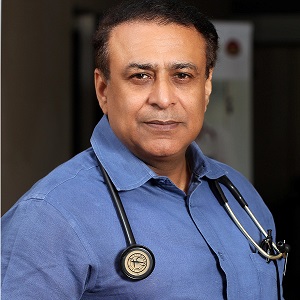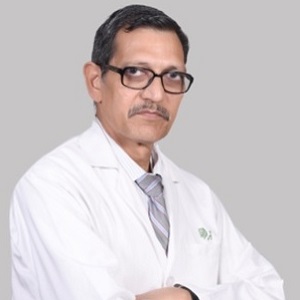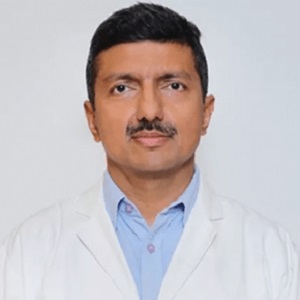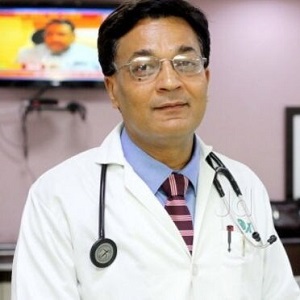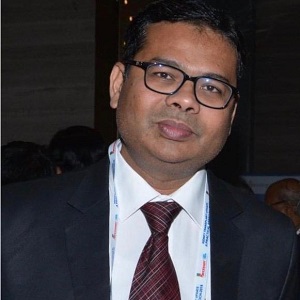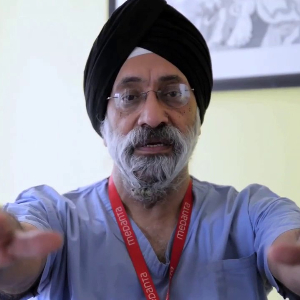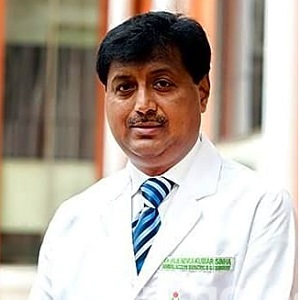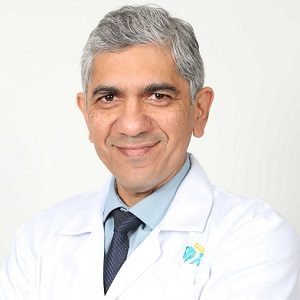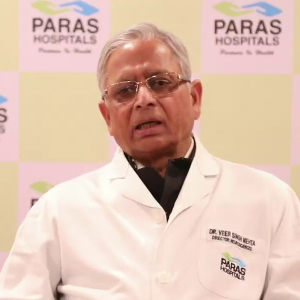Best Doctors in India for Alcoholic Hepatitis Treatment
- Nephrologist, New Delhi, India
- Over 22 years’ experience
Profile Highlights:
- Dr. Sanjiv Jasuja is a Nephrologist & Transplant Physician at the Indraprastha Apollo Hospitals, Sarita Vihar, and at Apollo Hospitals, Noida. Along with an MBBS, his educational qualifications include an MD in Medicine, a DNB in Nephrology, and an MNAMS in Nephrology.
- His 22 years of medical practice are highlighted by his memberships in various prestigious national and international medical societies including the Indian Society of Nephrology, Indian Society of Organ Transplant, Indian Society of Critical Care, Indian Society of Clinical Research, International Society of Nephrology, and European Dialysis & Transplant Society.
- Dr. Sanjiv Jasuja maintains a dedicated medical practice which is evident by his busy schedule in switching between the two branches of Apollo Hospitals, which he manages efficiently. Due to his firm hand and calm demeanor during operations, he has earned a respect among his patients which is evident by his high patient satisfaction rate.
- Nephrologist, New Delhi, India
- Over 20 years’ experience
Profile Highlights:
- Dr. D K Agarwal is a well-known nephrologist, who is currently associated with Indraprastha Apollo Hospitals, as a Senior Consultant in Nephrology. For over 20 years, he has been involved in nephrology, with indoor as well as outdoor patients.
- He specializes in Renal Transplant, hemodialysis, CAPD, and all kidney problems and diseases along with critical kidney patients with emergency management.
- Dr. Agarwal also specializes in handling kidney patients due to Diabetes and Hypertension. He has also published 59 papers national and international.
- Dr. Agarwal is also a life member of several renowned societies such as the Association of Physicians of India; Indian Society of Electrocardiology; Indian Society of Nephrology; Indian Society of Organ Transplantation, Hyderabad Transplant forum, and Indian Association of Clinical Medicine 1994.
- Eye Surgeon, Ophthalmologist, Gurugram, India
- Over 30 years’ experience
Profile Highlights:
- Dr. Sanjay Dhawan is one of the best ophthalmologists in Gurugram. In 1998 he was appointed as Assistant Professor of Ophthalmology at Manipal College of Medical Sciences, Nepal, and associated Himalaya Eye Hospital, a project of FECH of The Netherlands.
- Dr. Dhawan was also among the first to popularize the technique of SICS for mass application in New Delhi, and he probably was also the first to introduce a modified Topical Anesthesia to perform SICS. The large-scale surgical experience helped him refine the surgeries of Phacoemulsification, MICS (Phakonit), LASIK, Supra-Whitnall’s Resection of LPS for Ptosis, etc.
- Nephrologist, New Delhi, India
- Over 20 years’ experience
Profile Highlights:
- Dr. Kailash Nath Singh is one of the best Nephrologists working in New Delhi.
- Dr. K.N. Singh is currently working as a leading Senior Consultant in Nephrology & Multi-Organ Transplant unit at Indraprastha Apollo Hospital, New Delhi, India.
- He has also been felicitated recently by his Holiness “DALAI LAMA” for his excellent work in Kidney Transplants.
- Nephrologist, Gurugram, India
- Over 20 years’ experience
Profile Highlights:
- Dr. Shyam B Bansal is Associate Director in Medanta’s Institute of Nephrology and Kidney Transplant.
- He is also known for establishing the department of Nephrology at Medical College Gwalior in 2006.
- Apart from that, Dr. Bansal has published extensively in the field of kidney transplantation and also has the honor of publishing the first case report of kidney transplantation in an HIV-positive patient in India.
- Interventional Cardiologist, New Delhi, India
- Over 53 years experience
Profile Highlights:
- Dr. Mahesh Chandra Garg is an Interventional cardiologist working at Indraprastha Apollo Hospital in New Delhi with experience of over five decades in the field. He has an interest in Cardiovascular Intervention and Imaging.
- Dr. Garg has specialized in Enhanced External Counterpulsation, Chest Pain Therapies, Diabetic Cardiovascular complexities, and Coronary Artery Bypass Graft Surgery.
- He achieved excellence in invasive cardiology as a result of his participation in specialized training programs and conferences. Dr. Garg provides valuable care for his patients while also encouraging them to adopt a healthy lifestyle.
- He delivered presentations at numerous conferences and published papers in well-known national and international medical journals.
- Neurosurgeon, Gurugram, India
- Over 30 years’ experience
Profile Highlights:
- Dr. V P Singh is a renowned Neurosurgeon with over 30 years of veteran experience. His competence in cranial, spinal, and peripheral nerves has helped him successfully perform 400+ Intracranial Aneurysm surgical procedures.
- Dr. Singh has also been credited for initiating the Gamma Knife Unit and epilepsy surgery program at All India Institute of Medical Sciences, New Delhi.
- He is proactively involved in the treatment of arteriovenous malformations by radiosurgery techniques and is currently the chairman of the Institute of Neurosciences, Medanta.
- Bariatric & Laparoscopic Surgeon, Gurugram, India
- Over 25 years’ experience
Profile Highlights:
- Dr. Bijendra Kumar Sinha is a highly skilled laparoscopic and GI surgeon with an extensive experience in advanced laparoscopic GI Surgery.
- He has done more than 7000 laparoscopic surgeries including lap hernia surgeries, lap GI surgeries, and lap solid organ surgeries.
- He has got hands-on training in MIPH for piles surgery and STARR procedure for partial prolapse and obstructive defecation syndrome by Dr. Antonio Longo inventor of the procedure.
- Orthopaedic Surgeon, New Delhi, India
- Over 34 years’ experience
Profile Highlights:
- Dr. Yatinder Kharbanda is a well-known orthopedic surgeon and working at the Indraprastha Apollo Hospital, New Delhi.
- The doctor has expertise in Joint Replacement Surgery & revision surgery. He accumulated 34 years of experience, working in the United Kingdom and India.
- Dr. Kharbanda has expanded his skills with various orthopedic training programs at Birmingham, Linz Austria, Liverpool, etc.
- He is interested in polytrauma and complex trauma. The OrthopaedistDr. Yatinder Kharbanda performs Arthroscopy, Sports surgeries, hip and knee replacement surgeries, and more to help patients resume their active lifestyles after an orthopedic setback.
- Several institutes have recognized Dr. Kharbanda’s contribution to medical services.
- Neurosurgeon, Gurugram, India
- Over 38 years’ experience
Profile Highlights:
- Dr. (Prof.) V S Mehta is a leading Neurosurgeon in India and is considered among the best neurosurgeons in the world.
- He holds an experience of over 38 years in the field and is an expert in Brachial Plexus surgery, brain stem surgery, spinal tumor surgery, brain aneurysms, and brain tumor surgery.
- He has been honored with the Padma Shri for his dedication and contributions to neurosurgery and spine surgery in India.
- In Paras Dr. V S Mehta has been part of the team to first use the Image-Guided Brain Tumor Navigation Technology for Brain tumor surgery in India.
Best Hospitals in India for Alcoholic Hepatitis Treatment
ALCOHOLIC HEPATITIS
Alcoholic hepatitis is a liver infection, which is mainly caused by frequent, heavy use of alcohol. Fat can build up in the liver cells, which might lead to inflammation as well as scarring of the liver.
Alcoholic hepatitis might be mild or severe. A patient might even need a liver transplant if proper treatment is not provided, or if they don’t stop consumption of alcohol.
It is also notable that all heavy drinkers don’t develop this condition, and sometimes this condition even develops in people who drink moderately. However, if you are diagnosed with this condition, it is important for you to quit drinking alcohol. People who continue drinking alcohol might face a huge risk of serious liver damage as well as death.
Symptoms
Depending on the amount of damage to the liver, the symptoms can vary. If you are having a mild form of the disease, you might not even experience any symptoms at all. However, as the damage continues to grow, you might experience the following:
- Changes in appetite
- Dry mouth
- Weight loss
- Pain or swelling in the abdomen
- Jaundice, or yellowing of the skin or eyes
- Fever
- Nausea and vomiting
- Easy bleeding or bruising
- Changes in your mental state, including confusion
- Fatigue
The symptoms of this condition are similar to those caused by a few other health conditions. Therefore, if you develop any of these symptoms, it is best to get a proper diagnosis as well as begin treatment.
Causes & risk factors
Alcoholic hepatitis generally develops when the alcohol you drink causes damage to your liver. However, it is not clear why alcohol does this damages only to some heavy drinkers.
Few factors that are known to play a role in this condition include:
- The body’s process that breaks down alcohol produces some toxic chemicals
- These chemicals can trigger inflammation that can destroy the liver cells
- Thus, over time, scars replace healthy liver tissue, thus interfering with the function of the liver
- This irreversible scarring, which is also termed cirrhosis, is the final stage of alcoholic liver disease
If you have hepatitis C and continue to drink, even moderately, you are more likely to develop cirrhosis.
Some heavy drinkers are also malnourished because they don’t eat a proper balanced diet. Alcohol and its byproducts also prevent the body from absorbing nutrition properly. Lack of nutrition can contribute to liver cell damage.
Some other risk factors that can lead to this condition include:
- Your sex- Women are usually at a higher risk of developing alcoholic hepatitis since the way alcohol is processed in women is different.
- Binge drinking- Having over five drinks within two hours for men and four or more for women can increase the risk of alcoholic hepatitis.
- Obesity- Heavy drinkers who are overweight are also more likely to develop alcoholic hepatitis and to progress from that condition to cirrhosis.
- Race and ethnicity- Hispanic and Negroid people might be at higher risk of alcoholic hepatitis.
- Genetic factors- According to studies, there may be a genetic component in alcohol-induced liver disease. However, it is difficult to separate genetic and environmental factors.
Diagnosis
If you are showing symptoms of alcoholic hepatitis, your doctor will first inquire about your medical history and alcohol consumption. Next, he/she will perform a physical exam to see if you have an enlarged liver or spleen. They might also need a few more tests to confirm your diagnosis, such as:
- Complete blood count (CBC)
- Liver function test
- Ultrasound of the liver
- Abdominal CT scan
- Blood clotting tests
In some cases, a liver biopsy might also be needed to confirm the diagnosis of alcoholic hepatitis. A liver biopsy requires your doctor to remove a tissue sample from your liver, which is then tested in the lab. This method helps to show the severity and type of liver disease.
Treatment
Stopping alcohol consumption is the most important treatment for alcoholic hepatitis. There is no cure for this condition, but treatment can help in reducing or eliminating symptoms, or stopping its progression.
It is also important to note that scarring of the liver is permanent, but treatment can aim to restore as much function as possible.
Dietary changes
Medication
Liver transplant
The best hope of recovery is to be aware of the signs and symptoms as well as to reduce, manage, or if possible, completely stop consumption of alcohol.
Complications
Alcoholic hepatitis might lead to severe other complications such as:
- Enlarged veins (varices)- In this condition, blood that is unable to flow freely through the portal vein, can back up into other blood vessels in your esophagus or stomach.
- Hepatic encephalopathy- This condition can be caused by the buildup of toxins if your damaged liver is unable to remove all the toxins from your body. It involves confusion, drowsiness, and slurred speech.
- Ascites- Ascites is a condition in which the fluid that accumulates in the abdomen may get infected and thus, require treatment with antibiotics. Although this condition is not life-threatening, it can be a sign of advanced alcoholic hepatitis, or cirrhosis.
- Kidney failure- A damaged liver affects blood flow to the kidneys, thus resulting in kidney failure.
- Cirrhosis- The scarring of the liver might lead to liver failure.
Prevention
Alcoholic hepatitis might be prevented if you take the following steps:
- Drink alcohol in moderation, if at all- For healthy adults, moderate drinking means no more than one drink a day for women of all ages and men older than 65, and not over two drinks a day for men aged 65 and younger. However, if you prevent all alcohol, it is a certain way to prevent this condition.
- Check before mixing medications and alcohol- Ask your doctor if it’s safe to drink alcohol while you are taking medications. Consider reading the warning labels on over-the-counter medications as well. Don’t drink alcohol when you are taking medications that warn of complications when combined with alcohol.
- Protect yourself from hepatitis C- Hepatitis C is an infectious liver disease that is caused by a virus. If it is left untreated, it may lead to cirrhosis. If you are having hepatitis C and you consume alcohol, you’re generally more likely to develop cirrhosis than if you don’t drink.

